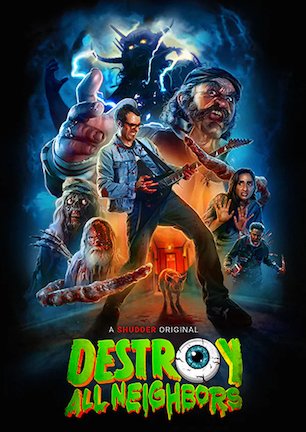Studio: IFC Films
Director: Haifaa Al-Mansour
Writer: Emma Jensen
Producer: Amy Baer, Alan Moloney, Ruth Coady
Stars: Elle Fanning, Douglas Booth, Stephan Dillane, Joanne Froggatt, Ben Hardy, Maisie Williams, Bel Powley, Tom Sturridge
Review Score:
Summary:
A tumultuous love affair with poet Percy Shelley inspires Mary Wollstonecraft Godwin to pen her seminal novel Frankenstein.
Review:
“Mary Shelley” opens with onscreen text quoting a passage from Frankenstein. While choir-like warbles from an operatic voice echo underneath, Elle Fanning then narrates Mary’s internalized words as she reads to herself in a picturesque graveyard dotted with mossy tombstones. Thunder peals overhead. Mary needlessly looks up to confirm a storm in the sky before collecting her skirt and rushing through a fog-shrouded forest toward home. A sweeping camera subsequently captures the improbable bustling of a backlot’s London street choked with children jumping rope, women filling food baskets, and men bailing hay.
For good or for bad, the movie identifies its operating order within this single three-minute sequence. “Mary Shelley” means to cram a kitchen sink of costume drama clichés into an overlong mood exercise obsessed with thickly laid theatricality. Even a static establishing shot of a nighttime sky can’t refrain from having a star shoot across the screen.
Without worrying about tailored details, think up a list of common elements employed in any romanticized movie set in 19th-century England. Two young lovers giggling as they run inside from the rain. That same couple sprinting into each other’s arms as music swells in time to a hungry kiss. The sound of horse hooves clopping on cobblestones. A soundtrack scored predominately around haunting piano melodies. Women in bonnets and crinoline. Men in top hats and tightly wrapped neckwear.
“Mary Shelley” checks every expected box and then some. The only item omitted is a compelling incentive to remain engaged in a stiff telling of a story that should be passionately torrid instead of timidly tame.
“Mary Shelley” recounts the time in the titular author’s life between meeting her muse, poet Percy Shelley, and struggling for recognized authorship of her best known novel, Frankenstein. Among other things, this was a period of musical chair lovers as the pair penned and denned with Mary’s stepsister Claire and Dr. John Polidori at Lord Byron’s hedonistic Geneva estate.
The movie doesn’t dip into subjects too scandalous however. Suggestions of infidelity involving Mary or Percy remain precisely that: suggestions. Their romance is portrayed as traditionally pure, with argumentative issues mostly seeded by Mary’s assertion of individuality against unfair gender dynamics. The hurdle of Percy already having a wife when he meets Mary sees itself hurriedly jumped as a narrative inconvenience to be acknowledged, not truly addressed. “Mary Shelley” merely pauses to belch such hiccups before reconciling the relationship and returning to a PG-13 tone.
This biopic might supplement, but certainly won’t supplant a proper biography. In the interest of streamlining this slice of Mary’s story, the script fudges facts such as the existence of Mary and Percy’s second child. It also fabricates others like a cheesy climax where Mary’s issues with her father and husband are resolved simultaneously with swift sentimentality. Any student counting on “Mary Shelley” to fill in the blanks of a book report would be best advised to search elsewhere.
Taking liberties allows “Mary Shelley” to relax into a Lifetime-like groove of soap opera staging. Pomade existed in Percy Shelley’s lifetime, though it’s difficult to not snicker at his boy band coif complementing a pretty pout, as though he just stepped off the set of “Twilight.” Ribbing aside, the film’s art and costume departments do terrific work recreating the era. Too terrific to be frank. Sets are stuffed with so many people and props that the fantasy stays filmic as only a vague representation of reality. The cinematography of slow pans and constant cuts to/from horse-drawn carriages becomes routine enough that the movie cannot transcend its medium.
“Mary Shelley” makes all the requisite motions for constructing an effectively plain period piece. The film looks the part, although it unfolds rigidly. Storytelling focused on functional formalities permits acting to be no better than acceptable. Wall-to-wall dialogue dries out melodrama. It’s a challenge to ascertain how much, if any, of the visualized effort leads to an increased understanding of the subject. More or less, “Mary Shelley” comes out of its end credits as an inessential study on one of literature’s essential authors.
Review Score: 50







Under Margot's directive, the trio sets out for a familiar "found footage" adventure that's heavy on the familiar but light on the adventure.